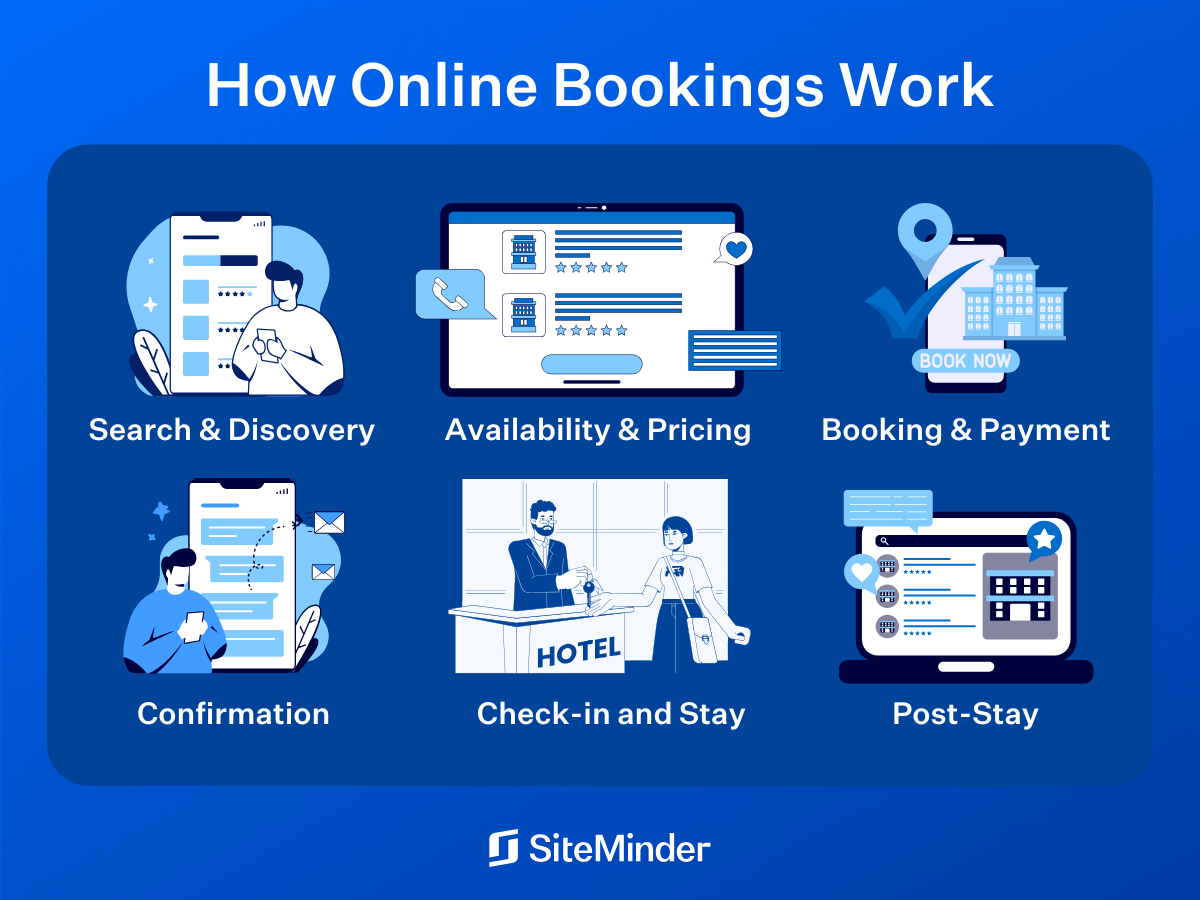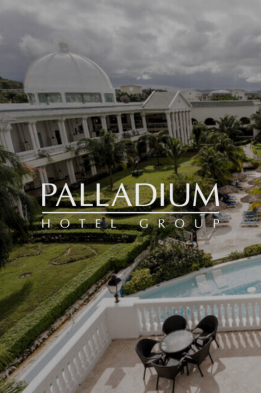What are online bookings in the hotel industry?
Online bookings are the lifeblood of the modern hotel industry. With just a few taps on a smartphone or clicks on a computer, guests can secure their stay at your establishment from anywhere in the world. This seamless process is powered by sophisticated yet user-friendly online booking systems, hotel websites, and online travel agencies (OTAs).
Online bookings are about both convenience and connection. These reservations give hotels the unique opportunity to capture valuable guest data and preferences. This information is incredibly valuable for crafting personalised experiences that not only meet but exceed expectations. Imagine knowing your guest’s favourite type of pillow or their preferred check-in time before they even arrive. That’s the kind of customer focus that turns first-time guests into lifelong advocates.
This blog will tell you everything you need to know about online bookings and how to take advantage of them.
Table of contents
How do online bookings work for hotels?
Online bookings for hotels is a diverse process with many different customer journeys.
However, there are generally two main routes:
- Direct online booking: This is when a guest books through a hotel’s individual website, typically through a dedicated online booking engine. Hotels can also funnel direct traffic via metasearch services or social media pages. This captures all of the guest information, integrates it with the hotel’s property management system, and blocks out that room for the booked period in the hotel’s scheduling.
- OTA booking: This is when a guest books through an online travel agent, such as Expedia or Booking.com. In these cases, the guest books through the OTA’s booking process, typically through the OTA website. Hotels must be listed on the given OTA to appear as an option for that guest. Once booked, the OTA takes a commission from the sale, and then transfers the booking details to the reserved hotel. From there, depending on integrations, a hotel’s property management system will then translate that information into the hotel’s calendar, schedule, and listing availability.
This is a broad overview of how online bookings work for hotels and there will be unique situations and processes. Generally speaking, however, online bookings will either be direct or through an OTA.
Make online bookings effortless with the best technology
With a feature like Channels Plus, SiteMinder makes it easy for you to connect more online channels all in one place.
Learn more
Why are online hotel bookings important?
We know that, while COVID-19 took a toll on tourism, the excitement of international travel is quickly returning as fears ease and restrictions loosen.
Figures from the UN World Tourism Organisation show that, in 2022, the number of people travelling internationally reached 900 million, with cautious optimism the feeling of the day across the board. For many, if not most, of those travellers, online booking will be their preferred method of securing accommodation for their inevitable overseas adventures.
Online distribution is growing at a faster pace than the entire travel market. The American Hotel and Lodging Association (AHLA) estimates 500 online bookings are made every minute, across the US, alone. It’s a fascinating statistic that emphatically demonstrates how much the hotel industry has changed over recent years – and how imperative it is for hoteliers of all sizes to master their online booking process.
This heightened desire to travel and see parts of the world that 25 years ago would have been considered out of reach, and of course too costly, has been spurred on by the Internet economy, the desire for experiences once reserved for the elite, and the sheer volume of information that’s available to travellers making it more accessible.
But if we dig deeper into this observation, the broad accessibility of information isn’t just changing a handful of travel industry trends, it’s completely shifting the balance of power – from a consumer economy with intermediaries, to a user economy with “self-service”.

The consumer economy is now a user economy
Travel knowledge and information used to lie in bricks and mortar, dominated by brands and agencies, renowned for delivering an expertise that could be rarely challenged.
But the Internet has caused a tipping point to occur, enabling hotels to sell themselves to potential guests who appear to know precisely what they want, and the research they need to carry out in order to make their travel aspirations a reality.
Everything from photos through to guest reviews are creating information overload, as user generated content becomes a critical variable in the consumer’s battle for power. In the early days, travel agents and experts influenced consumers with experience and brochures illustrating what was available.
Later OTAs, and especially Booking.com, revolutionised this idea of putting the traveller in control by providing more content and information available at their fingertips.
Now we see the user economy taking control with the growth and development of Airbnb, Uber, Flip.to, and many others enabling self-selection. Travellers can have an authentic experience of living like a local, in the neighbourhood, visiting their host’s local favourites – and quite often at a fraction of the price. Travellers are willing to transact beyond hotel rooms, and as a result guests are becoming more efficient at making their final booking decisions.
The new doesn’t always replace the old
While online booking dominates among travellers, that doesn’t mean that traditional travel agent driven bookings have disappeared entirely. Many guests still use physical, brick-and-mortar travel agencies. Research has shown that about 30% book their trips via travel agents or tour operators – about the same as book direct.
However, digging deeper into the data, there is an important addendum to make. Nearly half of self-proclaimed regular travellers preferred using OTAs, followed by direct booking, leaving only 20% for travel agencies. The opposite was true for those who hardly ever travel: half of respondents in this category primarily use travel agencies, with a rough even split for the remainder between OTAs and direct booking.
The bottom line? Online booking is increasingly popular, particularly among those valuable frequent flyer guests. Hoteliers who haven’t yet mastered their online presence should do so to maximise their revenue. For hoteliers, it’s a question of managing and adapting to these changes. It’s evolution, not revolution.
How to harness the power of hotel bookings online
Hoteliers must think global and act local in order to capitalise on the guest’s winding path to purchase. We live in a multiscreen world, with many points of conversion, and it’s important to remember that rate is not the prime decision tool.
Yes, price is a big differentiator when assessing the challenge presented by the likes of Airbnb, but there are many more factors to consider. Hoteliers can take on the challenge in many ways.
1. Offer unique guest experiences
One example is to become more service-orientated, focusing on the elements of a hotel that home-sharing can’t offer – such as tour guides, chauffeured drivers, dry cleaning, restaurants, gyms and a bounty of amenities and loyalty points.
By offering an extraordinary guest experience, hoteliers can really capitalise on the impact of user generated content – reviews, social media check-ins, comments, ratings – and in turn use these positive affirmations to drive bookings.
2. Know where your bookings are coming from
A hotel’s biggest weapon in the fight for bookings is knowing the business mix inside out. Ask where your bookings are coming from. Ask what your local competition is doing to fill their rooms. Ask how you are driving your online and offline business. It is truly all about the details.
3. Use a channel manager
Hoteliers need to find balance and control of how your rooms are being distributed. Take charge of your bookings mix and ultimately your business.
Cloud technology, such as SiteMinder’s hotel channel manager, is levelling the playing field for independent hotels, helping them compete in a fast-changing market. It gives hotels of any size the power to be exactly where prospective travellers are – without the need to invest heavily in IT and systems providing more time for creativity and caring for your guests.
The multichannel, multiscreen world is now completely accessible, giving hoteliers greater opportunity to reach, attract, and convert global guests. Chain hotels have been doing this for years, reaping the benefits of having a visible online presence to ensure they turn lookers into bookers. It’s time for independents to take charge, challenge the status quo, and compete in the same way.
4. User-friendly booking process
In today’s digital landscape, a seamless and intuitive booking process is non-negotiable. A complicated or clunky interface can deter potential guests and lead to abandoned carts. SiteMinder’s user-friendly hotel booking engine is designed to simplify this process, guiding guests through each step with ease.
From room selection to payment confirmation, every touchpoint is optimised for convenience and speed. By reducing friction in the booking process, you not only enhance the guest experience but also increase the likelihood of converting browsers into confirmed guests.
5. Showcase riveting reviews
Reviews are the new currency of the digital age. They offer social proof and can significantly influence booking decisions. SiteMinder enables you to effortlessly showcase guest reviews and ratings directly on your booking platform. By integrating these testimonials, you’re not just displaying stars; you’re telling a story of satisfied guests and memorable stays. These authentic reviews serve as powerful endorsements, instilling confidence in prospective guests and tipping the scales in your favour when it comes to making a booking decision.

